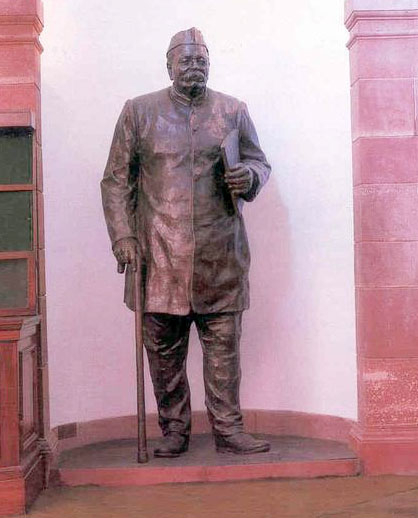Pandit Govind Ballabh Pant | 28 Jan 2021
Why in News
Recently, a statue of freedom fighter Govind Ballabh Pant was unveiled at its new location on a roundabout at the Pandit Pant Marg, New Delhi.
- The statue had to be relocated from its earlier location near Raisina Road circle as it 'fell within the new Parliament building layout'
Key Points
- Brief Profile:
- Govind Ballabh Pant is remembered as one of the country’s most prominent freedom fighters and an administrator who played a key role in shaping modern India.
- He was the Premier of United Provinces (1937 - 1939), First Chief Minister of Uttar Pradesh (1946 -1954) and Union Home Minister (1955 - 1961) and was a recipient of the highest civilian award, the Bharat Ratna in 1957.
- Early Life:
- Pant was born on 10th September 1887 in Uttarakhand, at Almora.
- When he was 18 years old, he started serving as a volunteer at sessions of the Indian National Congress, looking up to Gopalkrishna Gokhale and Madan Mohan Malaviya as his idols.
- In 1907, he decided to study law, after receiving his degree, he started to practise law in Almora in 1910 and eventually moved to Kashipur.
- In Kashipur, he established an organisation called Prem Sabha, that started working towards several reforms and also saved a school from shutting down due to non-payment of taxes to the British government.
- Contribution in National Movement:
- Govind Ballabh Pant joined the Congress in December 1921 and soon joined the non- cooperation movement.
- In 1930, he was imprisoned for organizing a Salt March inspired by Gandhi's earlier actions.
- He was elected to the Uttar Pradesh (then known as United Provinces) Legislative Assembly as the candidate of the Swarajist Party from Nainital.
- When in Government, he tried to bring in reforms which would do away with the Zamindari system.
- He also pleaded to the Government for lowering agricultural taxes on farmers.
- He encouraged many cottage industries in the country and raised his voice against the coolie-beggar law, which forced porters to transport the heavy luggage of British officials without any payment.
- Pant was always against a separate electorate for minorities, saying the step would further divide communities.
- During the Second World War, Pant tried to conciliate between Gandhi's faction, which advocated supporting the British Crown in their war effort, and Subash Chandra Bose's faction, which advocated taking advantage of the situation to expel the British Raj by any means necessary.
- In 1942 he was arrested again, this time for signing the Quit India resolution, and spent three years in Ahmednagar Fort along with other members of the Congress working committee until March 1945.
- Pandit Jawaharlal Nehru pleaded successfully for Pant's release, on grounds of failing health.
- Post Independence
- After independence, Govind Ballabh Pant became the Chief Minister of Uttar Pradesh. He worked for the upliftment of the farmers and the eradication of untouchability.
- After the death of Sardar Patel, Govind Ballabh Pant was made the Home Minister in the Union Government.
- As a Home Minister, he championed the cause of Hindi as the national language or rashtrabhasha.
